The Doctor and friends show up to a haunted house full of writers and end up meeting an old enemy instead. Does this episode inspire, or all flat? Let’s talk it out.
Time to dig into “The Haunting of Villa Diodati”.
Sylas: So… I didn’t like this episode. I was really invested in the moving haunted house aspect, but I feel like it should have been two or three episodes based on the themes they have to tackle, and I hate that it’s Byron and Percy and Mary Shelley. I’m not sure what the point was, other than to draw a parallel between Cybermen and Frankenstein’s Monster.
Emmet: Yep. My biggest problem is that this despite being clear on Byron being an ass, and putting in all these little details to make the events line up with what we know of history on that night, this story gives the greatest insult possible: It suggests that Mary Shelley didn’t come up with the idea of Frankenstein on her own, that the story came from this moment where she met a Cyberman. And despite the cleverness of that idea, it completely undercuts her creativity and ownership of Frankenstein. Given Mary Shelley’s importance as one of the earliest creators of SFF and genre fiction as we know it today, I can’t believe Doctor Who did such a disservice to her.
Sylas: Yeah, you’ve talked to me about that trope before, because it crops up in media every so often. I think people like the idea because it makes them feel special. It’s like the writer of the episode, and by extension the viewer, kind of gets to have a little piece of the credit for Frankenstein. But it’s so frustrating, not only because it robs Mary Shelley, but because it suggests that this is how creativity works. It’s just a slightly different version of the trope where inspiration just strikes and great writings and art come out fully fledged like some kind of supernatural bolt of genius.
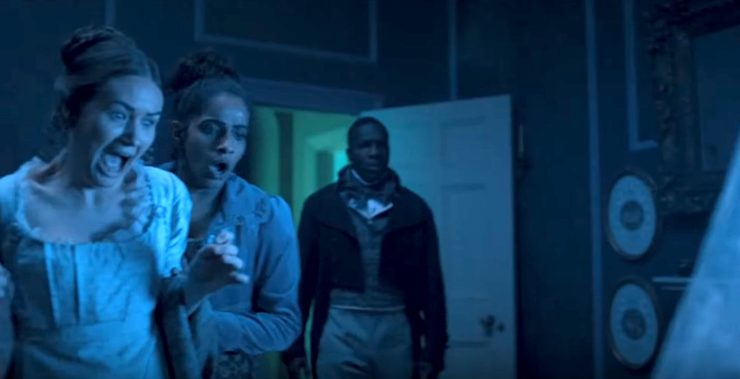
Emmet: They didn’t even make Mary Shelley the center of the episode. Percy Shelley is the important one, he’s the one with the Cyberium in him, he’s the guardian. Her main focus is to be in love with him and to be a mom. Even what she talks to the lone cyberman about is parent stuff.
Sylas: That was so weird. It’s a great sentiment, and it’s a very Doctor Who-ish speech. The fact that it doesn’t work on the lone cyberman is a really powerful gut punch that really reinforces his character and lets us know how dangerous he is.
Buy the Book
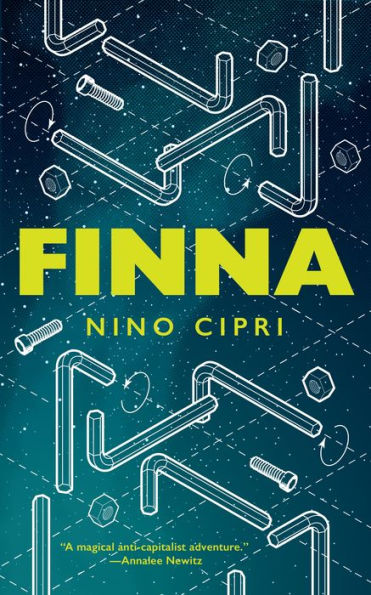

Finna
Emmet: It almost feels like the writer of the episode, found that it was a lot more fun writing Lord Byron—which is totally understandable because he’s hilarious as a person and it’s really enjoyable to poke fun at him the whole time—and is also maybe personally a bigger fan of Percy Shelley, which is why they both get more of the focus.
Sylas: Mary’s not even centered in the narrative. It’s really weird that team TARDIS shows up specifically because this is the night Mary Shelley conceives the idea for Frankenstein, but then the entire narrative is about something different. I kept thinking of “The Unicorn and the Wasp” and how that episode is so good at weaving in Agatha Christie’s importance as a writer into the unfolding of the plot, but rather than the alien influencing her, she’s the one accidentally influencing the alien. The episode actually becomes about her power, rather than the other way around.
Emmet: How much more amazing would this episode have been if it had taken place after Frankenstein came out, and it was just some woman who was obsessed with the book and then the cyberman showed up and she was like oh no it’s real.
Sylas: This episode would have been much, much better if the Doctor and co had just ended up in a random home in the late 18th century and then had a locked-room style adventure. Honestly, I didn’t like how everything ended up being about the Cyberium, and I really would have liked a haunted house episode where the problems just turned out to be some random, normally not dangerous alien technology that got sucked into some human by mistake. Because that part, with Percy Shelley not really able to control the perception filter, was really interesting, and I personally love Doctor Who episodes where the aliens or technology aren’t actually bad.
Emmet: That reminds me, why did the Doctor say the house felt evil? If it was Percy controlling it, it shouldn’t feel evil.
Sylas: Yeah, I guess because the power itself was the Cyberium? I still can’t figure out why the Cyberium didn’t want to go to the lone cyberman in the first place. Like I get that some enemy of the Cybermen sent it back in time to stop them, but shouldn’t it want to get back to the Cybermen?
Emmet: I think so. It definitely wants to stay in its host, and might even compel the host to protect it in some way.
Sylas: And then the Doctor said it wanted to be in her, not the cyberman, which was weird. Maybe it’s like the One Ring and it just wants to be in the most powerful person in the room.
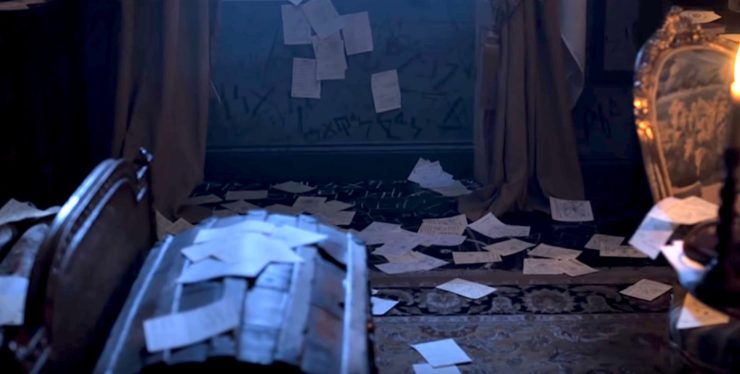
Emmet: That’s what it seemed like. It wasn’t very clear.
Sylas: A lot of it wasn’t very clear. And I felt like they had such big powerful themes that they quashed into one short episode. There’s the theme that the Doctor is always forced to make the big decisions about who can be saved and who can’t, and protecting the timeline, and choosing between a few people dying or many. And then there’s the theme of the importance of words. And then there’s the theme of the Doctor usually always being able to pull off a last-minute save of a situation to stop the bad guys, and this time not being able to do that.
Emmet: Yeah. I loved her speech about how words are important. I wish she had been saying it about someone else, though. It’s such an momentous thing to say at a point in time where we keep talking about the power of language, and it matters a lot, but it’s not just about the great titans of literature. It’s about everyone, and the moment would have been better served if she had been talking about someone we didn’t know about.
Sylas: Right, because she’s talking to Ryan about how one life is just as important as the thousands that will die by the Cybermen, and about how a single life changed will affect the future in huge ways, but because she’s talking about someone famous and specifically about how this famous person’s words carry on through time, it sounds like it’s only because of those things that his life matters. And it really brings up for me something that has been bothering me for a while, which is—why is almost every episode this season about them meet up with famous historical figures?
Emmet: And again—this time she didn’t mindwipe any of them.
Sylas: Ugh, you’re right. That’s… I mean if she had mindwiped them, that at least would have addressed some of your complaints about Mary Shelley’s inspiration for Frankenstein. I would still like it better if it wasn’t her and Byron et all, but it would at least have been a little better. I mean, it would have been better if she showed up at one of their parties after Shelley had already written Frankenstein, and then had her confront this alien from the future who is actually very much like what she had written.
Emmet: True. And then her desire to reach him compassionately, and to connect with his emotions, would have been about confronting the very themes she wrote about in the real world.
Sylas: Yeah, I agree with that. But I also agree that there was really no reason for them to be in the episode at all. Doctor Who has always been pretty sparing with having the Doctor and companions meet up with historical figures, and the ones we actually see on screen usually end up being accidents, like it was with Charles Dickens, and Agatha Christie, and Madame de Pompadour.
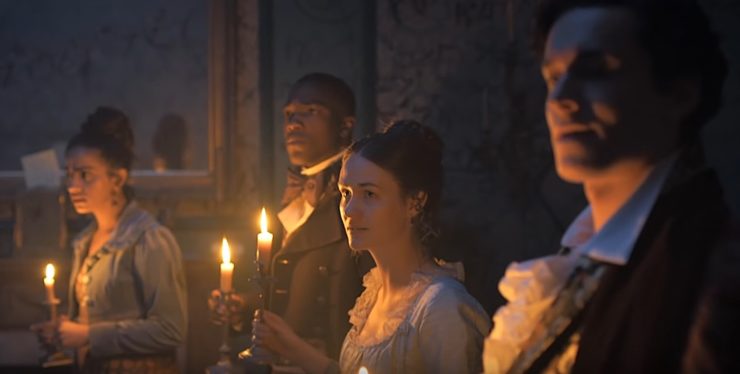
Emmet: Queen Victoria and Shakespeare, too. They do meet Van Gogh on purpose, but it’s not as common.
Sylas: Yeah, I mean, there’s a bunch, of course. I know I’m forgetting a lot of them, especially the ones from Moffat’s era. But I do like most of the “accidental meeting” episodes better. They fit into the sort of bombastic, coincidence-as-fate style of the New Who universe, like to the point where it’s a joke. Wait, we met Charles Dickens and then ghosts showed up? Agatha Christie’s here and suddenly someone gets murdered in the library with a lead pipe? Life with the Doctor isn’t just about seeing incredible things, it’s also about seeing how friggin’ weird the universe really is.
Emmet: I’m still thinking about the part where Ryan was so upset that someone was threatening to get a gun and shoot him. I’m sure that reads worse to an American audience, where the threat of gun violence is a present and terrifying issue, but yikes. Also I thought Polidori’s sleepwalking thing was a little weird.
Sylas: I liked that, actually. His character is kind of the least developed and the episode is such a mess, I think that’s why it comes off weird. But the idea of a sleepwalker being unaffected by a perception filter was really clever, I thought, and I loved that being the detail that allowed the Doctor to work it out. That’s kind of what I was driving at when i said this felt like several episodes worth of themes. You could do a whole locked room, haunted house episode that hinges just on the mystery of the perception filter. And then you could do a whole other one that was about the team trying to keep some man who is not Percy Shelley safe from the lone cyberman, only to have the doctor eventually realize that she can’t protect him and the Cyberium, and making the choice that she makes at the end of this episode.
Emmet: I loved the joke about her being from the North.
Sylas: Yes! That was such a lovely callback.
Emmet: I also thought Ryan trying to play chopsticks on the piano, and having trouble, but still trying.
Sylas: I really need to learn to be more like Ryan. His whole thing about Grace teaching him that there’s no reason not to try, and to keep at it, is something I really feel like I could stand to internalize.
Emmet: You definitely could, my love.
Sylas: Graham was also really cute in this episode. Ghosts brought him food! And the Doctor saying that she might be the Guardian was so funny.
Emmet: And Yaz is slightly gay for the Doctor, when she was talking to Miss Clairmont about enigmatic people, and if they would trade it for “reliable and dull.”
Sylas: Yeah, it reminded me of Martha a little, and how she struggled. We also got a return of the Doctor’s attitude about being the big magic decider person, with that whole “the structure of this team is a mountain, and I’m the summit making all the hard decisions alone” thing. I think this is the first time we’ve really seen her put her foot down so strongly.
Emmet: I wish they had leaned on that a little harder, at least in explaining why she feels that way. Because it’s about her having the broader perspective and the experience to weigh things, but that’s never mentioned in context. But the best return of all?
Sylas: Yes?
Emmet: The Doctor in that awesome waterloo helmet.
Sylas: I love a good plume!
Emmet: It’s cutest when she does it.
Sylas: You are not wrong.
Sylas K Barrett approves of Graham and his need for snacks.
Emmet Asher-Perrin did like the creepy maybe-ghosts, though.










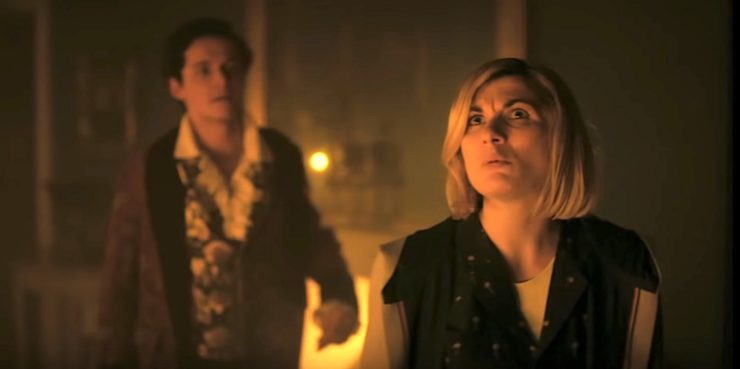
I’m glad it wasn’t just me being so furious for what this episode did to Mary Shelley and her creativity. And, how could any sane time traveler think it would be okay to arrive at a precise moment in time where a small group of people are alone and bored so they decide to write stories? Answer. None.
Last season, the Doctor described her fam’s power structure as equal. Now, she’s on the top of the mountain with them far below her with no real opinions. And the only opinion given by Ryan was insulted away. Bleech.
The return of the Cybermen is a total bore. They and the Daleks are plot cockroaches kept alive by writers who can’t be bothered coming up with new bad guys. Another bleech.
The only real excitement was the Doctor offering the possibility that ghosts exist. Now, that would be interesting.
Okay, seems I might be in the minority in actually really liking this episode. Sorry but I don’t buy the idea that it somehow takes something away from Mary Shelley’s creativity. Newsflash: Writers are inspired by their experiences, by things they’ve seen and read. Okay, so in real life Mary Shelley probably didn’t meet a reanimated corpse and decide “That’ll make a good story”, but the idea probably didn’t come from a vacuum either. Just because she got the idea from somewhere (and in real life, she did get the idea from somewhere), doesn’t detract from the fact that she had the talent and ability to turn that idea into a successful novel. It’s her that comes up with the phrase “the modern Prometheus” as a result. It’s nothing new: The Doctor took HG Wells on a trip into a science fiction adventure and fed Shakespeare some of his most famous lines (in a pre-Moffat deliberate meeting). Highlander did the episode where Methos was there and Mary Shelley was inspired by seeing an immortal “killed” and revived by a quickening. It’s not even the first time the Doctor’s been there: Big Finish got there first.
I will take the point however that Mary isn’t really that prominent. She gets a big speech near the end that doesn’t work, otherwise she’s mostly on the sidelines. I don’t think Percy Shelley’s that prominent either though: He’s basically the McGuffin, not on screen for long, not doing much when he is on screen, and only important because the Doctor says he is. Byron’s mostly a comedy ass. It’s actually Claire Clairmont who gets the biggest character arc, even if it’s just realising that her boyfriend’s a flake.
I wasn’t surprised by the Cyberman turning up because it was obvious the season’s heading that way and it’d be typical to seed the two-part finale in the previous episode. It does let the Doctor be really alien for possibly the first time though, making the hard decisions when no-one else is willing to step in. It’s possible some of the criticism on here might seem harsh in retrospect if we get a proper explanation for the cyberium next week. I didn’t see anything romantic in Yaz’s comments on the Doctor: It’s frustrating that so many Doctor/companion relationships seem to get reduced to the level of “a crush”, and she says outright that her situation is different to Claire’s. Interesting to get an American perspective on Ryan’s gun fear: I think it partly came out of the fact that, as a UK native, Ryan isn’t used to seeing guns at all.
It probably wasn’t the smartest idea for the Doctor to go to a party full of notorious hedonists and expect an intellectual debate. I loved the character of Fletcher, required by his station to go along with everything but clearly fed up to his back teeth with the whole lot of them, and it was a crime that he was killed off in such a casual manner.
I think they should have done a short trip to Leicestershire at the end, to erase the memories of baby Ada. Just in case. Who knows what a baby might do with the knowledge her estranged father will never pass on to her?
A cyberman is not made of different people. It’s Mary Shelley who comes up with that idea on her own. In fact there is nothing in common between a cyberman and the modern Prometheus beside both being unnatural transformations of a human being through technology; it’s just that inspiration came to Mary Shelley when their lives were on the line, and she did great (even if that wasn’t enough). She was supposed to come up with the idea on the night, and she did. No one made her.
I’m largely in agreement with E&S here. One other thing that bothered me was that, for all that he was an utterly reprehensible human being, the one thing that Byron was not was a physical coward. His hiding behind Claire Clairmont felt really out of character. His flirting with the Doctor should have been enough for her to sour on their relationship at the end.
I also got a very strong One Ring vibe from the Cyberium. That may have been because the scene of Shelley finding it was strongly reminiscent of Smeagol finding the Ring in Peter Jackson’s staging of that scene.
Finally, Mary using “modern Prometheus” to describe the Cyberman is wrong. That term doesn’t refer to the monster, but to the creator, stealing life from the gods just as Prometheus stole fire.
Time to give the Cybermen a rest.
Now if the crew has showed up after Mary had begun writing and she’d spent the episode drawing comparisons between her concept and the reality….
Is just me or are the writers of this series doing a real disservice to the historical figures they’ve depicted? Especially but not exclusively the female ones?
@@.-@: That’s how Mary used it. To describe whoever created the Cyberman.
Also, as with a lot of episodes this season, the pacing felt off. The switch from “the doctor has the cyberium” to “the doctor gives it up almost immediately because one battered cyberman makes a vague threat involving his spaceship” was too quick – it would have been nice if she had used its powers a little, and if we had been given some evidence there really was a ship she couldn’t stop.
Some other parts were very good – the callback to Twelve/Bill on not losing another companion to cyberization, Doctor having no time for flirty Byron. But i also 100% agree about the continued stories not giving Mary Shelley her own agency as an author.
I did like the Doctor briefly telling absentee-dad Byron how awesome his daughter is. Although I don’t like arts vs sciences trope where one is pitched as valuable and the other not, I would have liked the Doctor telling Byron and his ego that she’s his greatest contribution to the future.
Granted Byron was a cad but Shelley was no prize either. Mary was much to good for him.
terrible, canon breaking and neither doctor who or new-who. jodi whittaker is a terrible actress and the companions are basically wall art.
The Doctor’s speech about being in charge was a bit high handed and over the top.
And all of a sudden changing history can destroy people from the future, which hasn’t been the case in so many episodes, and raises the question why the Doctor decided to visit on this night of all nights, possibly destroying or changing the creation of one of the seminal tales of modern fiction.
And I was waiting for mindwipes, which have been a fifty-fifty proposition this season.
And just as I was wrapping my mind around the Doctor infested with a cyber-thing (which the 11th Doctor already did, and did quite well), she gave it up.
Some nice atmosphere, and nice moments, but it didn’t hang together very well.
@1.MByerly: Who ever said The Doctor was a sane time traveller in the first place?
@2.cap-mjb: Please be assured that we who rather liked this episode are, at least, a minority of two! I thought it quite charming, though one must admit to having come to this episode after missing most of the series which leaves me unqualified to judge it as anything but a one-off. (-:
@11: The Doctor is often high-handed – and that speech felt very Doctorish (not quite “Time Lord Triumphant” but within looking distance of the truly dangerous Doctor).
*Interestingly, when the Doctor is most confident and arrogant, the Doctor is often making a mistake (“Hello Stonehenge” is a great speech, but convinces all the races in the universe that the Doctor is dangerous to the existence of the universe itself. “Colonel Runaway” is a bold, confident speech – that the Doctor makes on his way into a trap, etc.).
I rather liked this one, though it did feel like quite a lot was going on. And it might have been nice to have some more explanation of the two possible ghosts as opposed to leaving them at the end for a “huh!” moment for Graham.
@@.-@ Yes, Byron may have been a rake and a scoundrel but he was never a poltroon, and showing him cowering behind a woman’s skirts is a cheap way to get a laugh whilst doing a disservice to a man who died fighting someone else’s war.
Also, it bothers me that Fletcher is an actual historical character who lived to see Byron die and bring his body home. Not only does he get carelessly offed, but the consequences for history aren’t explored. If Percy dying might change all history, what about Fletcher? Without his trusty valet, Byron might never have made it to Greece, and the place might still be under Ottoman rule!
That said, I did like that the episode gives a lot of time to the lesser lights, like Clairmont and Polidori, rather than being laser-focussed on the Shelleys. And ends with an appropriate Romantic poem, though GRRM did use it first in his steamboat vampire novel.